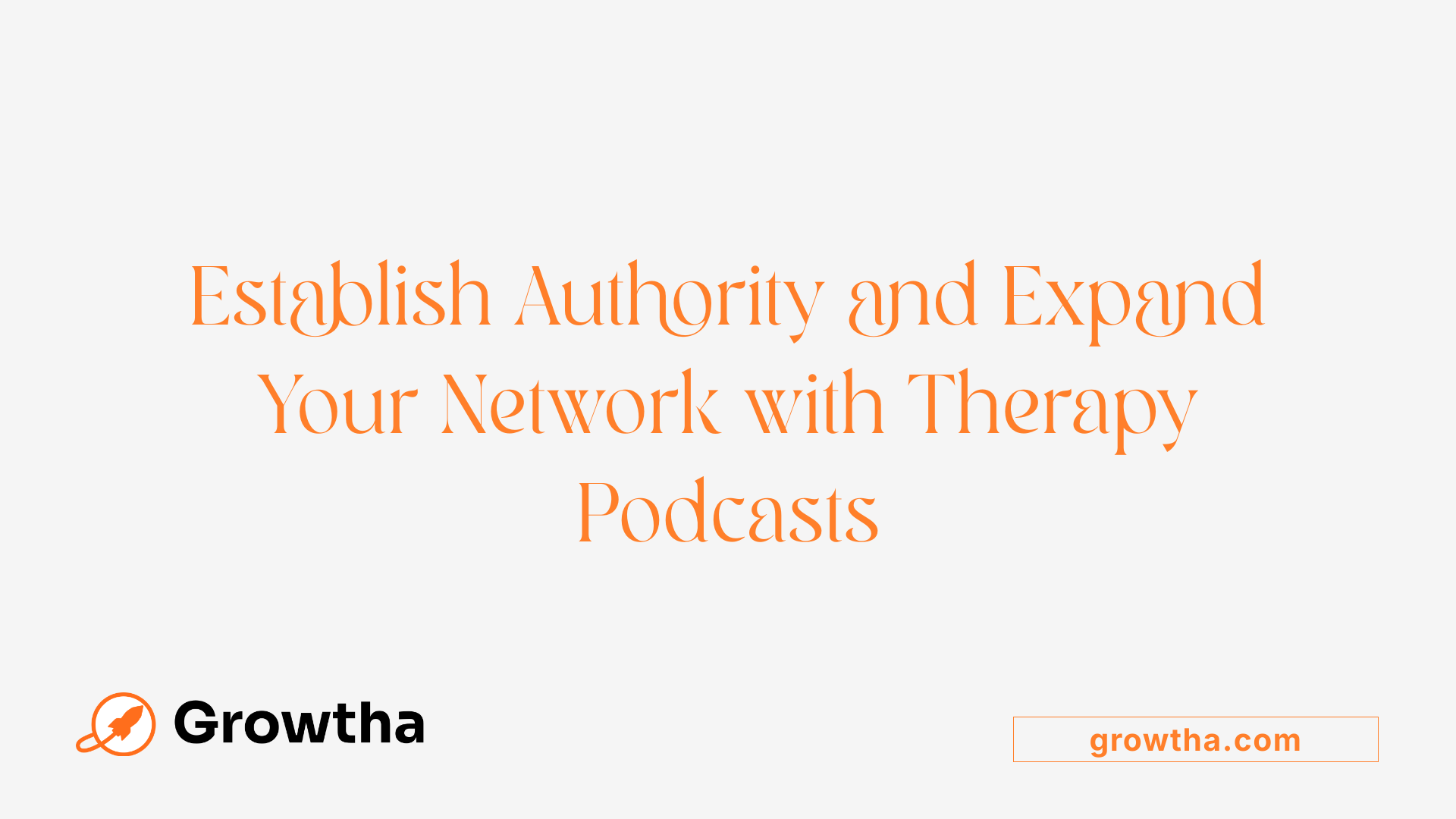In today's digital age, podcast marketing has emerged as an innovative and effective strategy for therapy providers aiming to expand their reach, deepen client engagement, and strengthen industry presence. This method offers a flexible, accessible platform to share expertise, reduce stigma, and connect with broader audiences. As the mental health sector continues to evolve, integrating podcasting into practice marketing plans not only boosts visibility but also solidifies therapists as thought leaders, fostering trust and growth. This article explores the multifaceted benefits of podcast marketing for therapy providers, offering practical strategies, current industry insights, and best practices for maximizing impact.

Podcast marketing offers numerous advantages for therapists aiming to grow their practice and deepen client relationships. One of the main benefits is increased visibility; podcasts help therapists reach a broader audience beyond their immediate geographic location. By sharing valuable insights and expertise, therapists can establish themselves as credible authorities in mental health, building trust with potential clients.
Podcasts also foster a personal connection, allowing listeners to hear the therapist's voice, stories, and insights, which helps humanize the provider and build rapport. This ongoing engagement can lead to increased client investment in the therapy process and encourage referrals.
Moreover, podcasting is a cost-effective marketing tool with the potential for long-term reach, making it an efficient way to supplement traditional marketing efforts. It supports professional development by keeping therapists informed about current research, new techniques, and industry trends, positioning them as thought leaders in their field.
Lastly, podcasts can generate additional revenue streams through sponsorships or promoting products and services, all while providing educational content that benefits both therapist and listener.
Podcasting amplifies a therapy practice’s visibility by allowing therapists to showcase their expertise on widely accessible platforms like Apple Podcasts, Spotify, and others. Consistent episodes on relevant topics attract loyal listeners who may turn into clients.
Hosting or participating as guests on relevant therapy or mental health podcasts helps build professional networks, opening doors for collaboration and referral opportunities.
Promotion plays a crucial role; sharing episodes via social media, emails, and the practice’s website broadens reach and draws new audiences interested in mental health topics.
Additionally, podcasts help practices differentiate themselves in a competitive market by demonstrating unique approaches, specialties, or philosophies. This enhanced presence builds trust and positions the therapist as an industry influencer.
Podcasts significantly elevate client engagement by providing accessible, ongoing educational content that fosters trust and loyalty. Consistent episodes featuring practical advice, success stories, or expert interviews deepen listeners’ understanding of mental health issues and available services.
This form of content allows clients to learn at their own pace, fitting into busy schedules like commuting or exercising, making continuous education more feasible.
Furthermore, sharing insights and real-life experiences humanizes therapists, enhancing rapport and encouraging potential clients to reach out.
Effective podcast marketing also boosts industry authority, strengthening a practice’s reputation. By delivering high-quality, authoritative content, therapists position themselves as trusted leaders, which supports long-term practice growth.
The healthcare and therapy sectors are witnessing rapid growth in podcast use, driven by increased mental health awareness and the demand for accessible, trustworthy information. Podcasts are now integral for patient education, professional development, and community building.
Key trends include cross-promotion across platforms, content repurposing (such as turning episodes into blog posts or videos), and community engagement efforts.
Performance indicators include download counts, subscription rates, listener feedback, and social media engagement. Sponsorship and advertising opportunities also reflect a growing market.
Health organizations and individual therapists aim to build credibility and trustworthiness through authentic content, making podcasts a preferred medium for health promotion and education.
Effective podcast marketing begins with clear audience targeting and selecting topics that resonate with potential clients. Maintaining high-quality production, such as using good microphones and editing tools like GarageBand or Audacity, ensures a professional listening experience.
Therapists should adhere to ethical standards by respecting client confidentiality and avoiding direct therapeutic advice. Embedding episodes into SEO-optimized content and directories maximizes discoverability.
Building credibility involves pitching to relevant podcasts as a guest, understanding the target audience, and preparing engaging discussion points. Consistent episode release schedules and active promotion on social media and websites help sustain audience interest.
Measuring success through listener metrics and feedback allows continuous refinement of content and marketing strategies.
To develop successful therapy podcasts, practices should identify niche topics aligned with their expertise and target audience. Developing a content calendar with regular episodes fosters audience anticipation and loyalty.
Recording should focus on authenticity, engaging storytelling, and educational value, all while respecting privacy and ethical guidelines.
Promotion strategies include sharing episodes across social media platforms, linking podcasts on websites, and repurposing content into articles, videos, or social media snippets.
Collaborating with other professionals through guest appearances or cross-promotions amplifies reach.
Monitoring performance metrics like listener engagement, website traffic, and client inquiries helps adapt content for greater impact.
By following these practices, therapists can effectively leverage podcasts to grow their practice, educate their community, and strengthen their professional presence.

Podcast marketing provides multiple benefits for therapists aiming to advance their careers and expand their industry presence. One major advantage is the ability to stay updated with the latest research, innovative treatment approaches, and emerging industry trends. Listening to and participating in therapy-related podcasts allows therapists to learn from experienced practitioners and thought leaders without leaving their offices.
Podcasts offer flexible learning options that fit into busy schedules, making it easier for therapists to access expert insights, detailed case discussions, and business advice across various topics like clinical strategies or social justice. By engaging with specialized podcasts, practitioners can deepen their knowledge, refine their skills, and stay current with evidence-based practices.
Additionally, podcasting can serve as a networking platform. Connecting with relevant communities and thought leaders through podcast collaborations, guest appearances, or listening engagements helps therapists build meaningful professional relationships. These connections can lead to referrals, mentorships, or collaborative projects that enhance both personal and practice growth.
Overall, podcast marketing acts as a tool for ongoing professional development, strategic marketing, and establishing a reputable presence within the mental health field.

To maximize their reach and influence, therapy providers should utilize a mix of effective tools and strategic tactics. High-quality podcast hosting platforms like Libsyn or Anchor ensure reliable distribution across major apps such as Apple Podcasts and Spotify. Social media channels—including Facebook, Instagram, and LinkedIn—are essential for promoting episodes and engaging with listeners.
Analytics tools like Chartable or Podtrac help measure listener engagement, preferences, and growth trends, enabling continuous optimization.
Consistent publishing schedules are vital, whether weekly or biweekly, to build audience expectation and loyalty. Content should be relevant, offering practical insights into therapy techniques, mental health topics, and practice management tips.
Community engagement enhances listener trust; responding to comments, hosting Q&A sessions, and collaborating with other industry podcasts foster connections.
Certain popular therapy-oriented podcasts, such as 'The Practice of the Practice' or 'Therapy for Black Girls,' serve as models for effective marketing insights. Therapists can learn from these to develop branding strategies and scaling techniques.
Overall, a blend of versatile tools and targeted tactics centered on delivering value and fostering community can effectively boost a therapy practice’s podcast marketing efforts.

Therapists can attract new clients by using podcasts as a platform to share expertise, success stories, and practical mental health tips. Regularly producing themed episodes that address common concerns—such as anxiety, depression, or relationship issues—helps build trust with potential clients. These podcasts serve as accessible educational resources, reducing stigma while demonstrating the therapist’s skill and warmth.
In addition, podcasts improve online visibility. Optimizing episode titles, descriptions, and transcripts for search engines (SEO) increases the chances of new listeners discovering the practice. Embedding links to the therapist’s website and booking pages within show notes makes it easy for listeners to reach out for consultations.
Strategically, content from podcasts can be integrated into various stages of the marketing funnel. Top-of-funnel content, such as general mental health tips and interviews with specialists, broadens awareness and attracts new prospects.
Middle-of-funnel efforts include offering downloadable resources or free consultation offers mentioned during episodes to encourage listeners to engage further. At the bottom of the funnel, direct calls-to-action (CTAs) like booking an appointment or signing up for a newsletter convert listeners into paying clients.
Consistent content production also cultivates loyalty, encouraging current clients to refer friends or share episodes, which extends outreach organically.
Effective CTAs are essential in turning podcast listeners into clients. Clear, natural prompts—such as inviting listeners to visit the practice’s website, schedule a free consultation, or follow social media pages—encourage immediate action.
Including specific offers or limited-time discounts for new clients during episodes or in show notes can further motivate inquiries. Regular reminders about how and where to contact the practice foster a sense of urgency and accessibility.
Promoting episodes across social media platforms and email marketing campaigns also amplifies these CTAs, guiding engaged listeners toward booking sessions.
Strategy Tactics Additional Notes Attracting New Clients Share expertise, success stories, and mental health tips Use SEO practices for online discoverability Integrating Content into Funnel Offer downloadable resources, use targeted messaging at different funnel stages Consistency builds trust and loyalty Creating Effective CTAs Include links, prompts, and exclusive offers during and after episodes Promote across multiple channels
By thoughtfully applying these strategies, therapists can harness podcasting not only as an educational tool but also as an effective marketing instrument that fills practice bookings and boosts professional growth.
Therapy practices can create a powerful marketing tool by thoughtfully integrating podcasts into their broader marketing efforts. The first step involves setting clear objectives, such as increasing practice visibility, establishing themselves as industry experts, or generating new client leads.
Next, practices should develop podcast content that aligns with their brand identity and target demographic. This means selecting relevant themes—like managing anxiety, improving relationships, or understanding mental health stigmas—and ensuring episodes consistently deliver valuable insights. By choosing topics that resonate with their ideal clients, therapists can attract and engage the right audience.
Incorporating podcasts into SEO strategies is crucial. Embedding episodes within blogs, optimizing show notes with relevant keywords, and ensuring podcasts are available on popular platforms like Apple Podcasts and Spotify can improve search engine rankings. Sharing episodes through social media channels and email newsletters further widens reach, allowing more potential clients to discover their practice.
Linking podcasts on a practice’s website helps to boost online visibility. Including clear calls to action in each episode—such as inviting listeners to visit the website, book a consultation, or subscribe—drives engagement and conversions.
To maximize marketing impact, a comprehensive plan should be established that involves regularly releasing high-quality episodes, leveraging guest appearances for broader exposure, and promoting episodes across multiple channels. Tracking metrics such as download numbers, listener engagement, and resulting inquiries can provide valuable feedback, guiding future content and promotional strategies.
By aligning podcast content with specific marketing goals, enhancing online presence through SEO, and integrating episodes into a well-rounded marketing plan, therapy practices can effectively utilize podcasts to attract new clients, build trust, and reinforce their professional reputation.

Therapists venturing into podcasting as a way to reach new clients and share their expertise must uphold strict ethical standards. The core principle is maintaining client confidentiality and respecting individual privacy at all times.
Confidentiality is paramount. When creating content, therapists should never disclose any information that could identify a client or compromise their privacy. This includes avoiding details about specific cases, personal stories, or anecdotes that could be traced back to someone without explicit consent. Adherence to professional ethical guidelines, such as those from the American Psychological Association or similar organizations, is essential.
In addition, therapists should not provide direct therapy advice during podcasts. While sharing general mental health information and guidance is encouraged, offering personalized recommendations without assessment is ethically inappropriate. Such advice could be misinterpreted or lead to unintended harm. Instead, the focus should be on broad topics like mental health education, coping strategies, or community awareness.
Transparency regarding the podcast's purpose is also important. Therapists should disclose any sponsorships, affiliations, or financial interests linked to the content. Obtaining permissions when featuring guest experts and clearly outlining the scope of the advice further reinforces ethical integrity.
Balancing marketing efforts with ethical obligations helps build trust with the audience and fosters professional credibility. Responsible podcasting demonstrates that therapists prioritize client welfare and adhere to industry standards, ensuring that their outreach efforts are both effective and ethically sound.
As the mental health landscape continues to embrace digital platforms, podcast marketing stands out as a dynamic, versatile, and impactful tool for therapy providers. By thoughtfully creating and promoting podcasts—focused on ethical standards, targeted content, and strategic outreach—therapists can elevate their visibility, establish credibility, and foster meaningful client relationships. The ongoing industry trends underscore the effectiveness of podcasts in expanding reach, supporting professional development, and strengthening industry connections. Implementing best practices, leveraging suitable tools, and maintaining a client-centered approach ensures that podcasting not only enhances practice growth but also contributes to a more informed, connected, and resilient mental health community. Embracing this innovative avenue promises sustained success and long-term benefits for therapy providers ready to adapt in a rapidly evolving digital world.